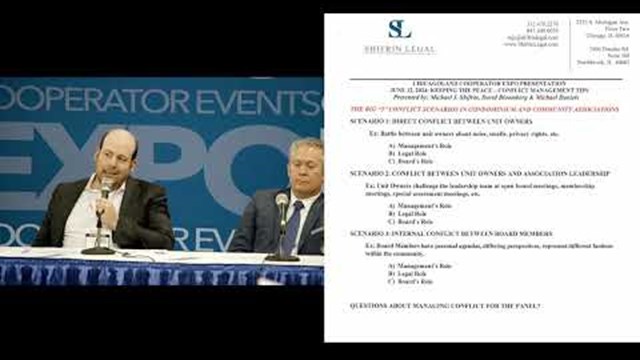Everyone wants to be a good neighbor—at least that’s what we’d like to believe. But, living in spaces where many people share walls, halls, and common areas can (and unfortunately does) lead to occasional conflict. That’s the unintended but inevitable consequence of shared interest community living. What one resident considers normal or acceptable may be seen quite differently by their neighbors. The ensuing irritation can build up, and if not addressed and defused, can throw a community into turmoil, leading to acrimony, dysfunction, and other costs, both social and economic.
When Good Neighbors Turn…
“All residents simply want to live in their home and community in quiet enjoyment,” says Brandon Clayton, Senior Community Manager, CMCA, AMS with Associa Chicagoland. “However, not everyone’s definition of ‘quiet enjoyment’ is the same, and when you live in a condominium, HOA or a cooperative, the philosophical meaning of quiet enjoyment often becomes challenged.’
According to many legal and management pros, the pandemic marked the beginning of a notable increase in reports of conflict between residents, as well as between residents and their boards and on-site staff members. Complaints around noise, odors, and other close-quarters conflicts have always been part of managing multifamily communities - but the sudden (and ongoing) increase in the number of people working from home turned what’s usually a trickle into a flood.
Jim Stoller, president and CEO of Chicago-based property management company The Building Group saw this phenomenon firsthand at the buildings his company manages, which are mostly luxury highrises in the city’s Gold Coast area and other downtown neighborhoods. “There’s a lot more people working from home…so there are a lot more eyes around the building.”
While Stoller makes clear that “Ninety percent of the people in the condos and co-ops we manage are really wonderful,” he notes that with so many people home all day, “There are a lot more complaints about neighbors—the smoke complaints have gone up; complaints about people hanging out in the lobby have gone up.”
When it comes to what specific behaviors or issues make for a ‘problem’ resident, “There are too many to list,” says Clayton, but often stem from “a homeowner who moves into a condo or HOA [but is] unfamiliar with how HOA and condo life works.”
“The issues that can come up around problem residents are infinite,” agrees Pamela Jonah, a partner with Marcus, Errico, Emmer & Brooks, a law firm based in Braintree, Massachusetts. “They can range from simple violations of rules concerning what may be stored in the common areas, or unapproved landscaping, or parking violations, to more serious issues such as harassment of other residents, hoarding and pest infestations, nuisance pets, and sometimes even criminal acts, such as threats, or even assault and battery.”
Path to Resolution, or Road to Perdition?
Howard S. Dakoff, a partner with Chicago-based law firm Levenfeld Pearlstein, LLC explains that not every squabble between neighbors, or every less-than-courteous email to management qualifies as ‘problem’ behavior. Complaints from residents about a neighbor must meet a “standard of reasonableness” for the offender to be considered in violation of an association’s governing documents, or warranty of habitability, in the case of co-ops. “I’ve had calls from managers [saying] that a unit owner is complaining that the vacuum in the unit above them is bothering them, that they’re trying to work and they can’t, and they’re demanding that something be done.”
This type of complaint, he says, does not meet the reasonableness standard. People are entitled to vacuum their floors during daytime hours, and in a multifamily setting, it’s inevitable that some noise from such activities will penetrate the walls of adjoining units.
“Ninety percent of the people we deal with are pretty reasonable people,” says Chicago-based attorney James Stevens, concurring with Stoller. When problems arise, “It's often either a lack of knowledge of the rules or the terms of the declaration, or a willful blindness to those rules and terms.” For minor annoyances - like someone in the habit of vacuuming at 11pm on Mondays - “A good property manager might even be able to…go out and try the friendly knock-on-the-door approach,” says Stevens. “They'll say hi and just talk about the issue before it gets to the point of our office sending a letter, which definitely sets a different tone.”
That being said, the severity of the disturbance should determine the scale and nature of the response. “If it's a less urgent concern, I often find it's useful for boards to start with a violation hearing, and to use that as a chance to have a face-to-face with the owner, and to talk to them to see if there might be some kind of possible resolution,” Stevens continues. “But if anything involves a present safety concern to the property, don't wait around for an extensive back-and-forth discussion.” In those cases, “The board should be quick to act if/when the safety and the security of the building is concerned.”
“If there is no reciprocated respect when dealing with a neighbor,’ says Avery Feldman, a senior account executive with New York City-based management company Maxwell-Kates, an Associa company, “it’s important to send them a notice as a reminder of each resident’s right to peaceful enjoyment of their home or apartment, and attach a fine to the notice. Any fines should be in accordance with a schedule found in the building’s house rules, which we make sure all buildings have. We do our best to avoid attorney involvement, but failing all other attempts at resolution, would certainly lean on building counsel.”
Regardless of the nature and severity of the problem, “Document all violations and complaints,” says Clayton, who also strongly recommends taking photos of violations when possible, with date and time evidence of when they are taken. “The more evidence provided,” he says, “the more likely the violation will stick in court,” should escalation to that point be unavoidable.
More Serious Situations
Sometimes, the circumstances underlying a problematic resident’s behavior are more complex than simple ignorance or entitlement. Hoarding behaviors are a good example—and a situation wherein the board and manager need to consider that a recognized mental illness is at the root of the issue, explains Jonah. “The resident often cannot simply act on their own to dispose of what an average person sees as trash—despite items being covered in mold and insects, for example. A simple demand letter with threats of fines will often go ignored. In situations such as this, we often advise the board to seek out the help of agencies like the board of health, elder services, if applicable, and/or hoarding task forces that exist across the state. When all else fails, it may be necessary to file suit seeking an order of the court allowing the association to hire professionals to assist, charging the legal fees and costs back to the unit owner’s account. To their credit, I have seen property managers assist residents in such a situation, again working with the help of outside family members, elder services, and the like.”
When a resident refuses to stop or change their behaviors despite warnings, fines, and other efforts to resolve the issue, it may become necessary to turn to the court system, says Carl A. Taylor, an associate with The Simone Law Firm, located in Cinnaminson, New Jersey. “The problem is the board only has limited ways to help two disputing neighbors. When in doubt, always keep communications [with the resident] public. That helps demonstrate that the residents’ issues are not so much a problem with the association, but rather that the issue is the problem resident him- or herself. Also, try as best you can not to take things personally. If it’s a civil issue, filing a lawsuit with the local court may be necessary. For some matters, contacting the local municipality may be another option. When warranted, and depending on the infraction, the local municipality does at times have other ways to handle a situation.”
And on the rare occasion that a resident’s behavior is harassing, violent, or otherwise illegal, “If the matter is criminal, residents must call the police and file a police report,” says Clayton. “Management and the board should not intervene,” both for reasons of liability, and for their personal safety.
Tread Carefully But Firmly
Resolving disputes with problem residents, who themselves are often frustrated and angry, may come down to interpersonal skills and good leadership. Making sure residents are informed of their rights - and the limitations of those rights - and that they feel they have a say in the governance and administration of their community goes a long way toward preventing issues from festering, says Clayton.
“Always invite all owners to board meetings, and make sure that meeting minutes are readily accessible. An open forum allows owners to speak openly about their issues, and to be educated on how things work at the association.” Also, “Make sure your governing documents are clear, concise, and up to date with the current federal, state, and local condo laws.” Finally, Clayton advises taking a critical look at your community’s rules, and making prudent adjustments where warranted. “If rules are vague or too relaxed, they won’t actually address issues, and residents will push back,” he says. “On the other hand, making rules and regs too strict can actually make residents more unruly,” and may lead to board members - and even managers - being dismissed in favor of leaders more in-step with residents’ needs and expectations.
What the issue of ‘problem’ residents in multifamily buildings and associations often boils down to is peoples’ ability—and willingness—to understand and respect the fact that they’re living on top of, underneath, and immediately adjacent to other people who have just as much right to the peaceful enjoyment of their homes as they do. When that understanding or willingness breaks down, or is absent altogether, boards and managers need to act promptly and prudently to address the issue before it escalates into a much bigger problem. Clear, unequivocal communication of rules and expectations is almost always the best place to start.
A J Sidransky is a staff writer/reporter for CooperatorNews Chicagoland, and a published novelist. He may be reached at alan@yrinc.com.










Leave a Comment